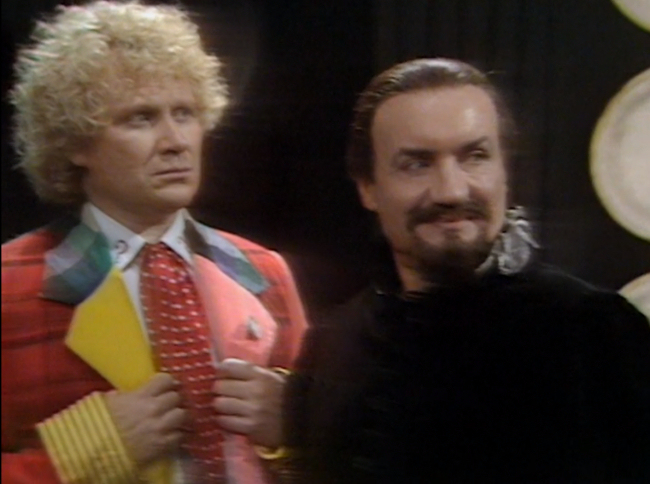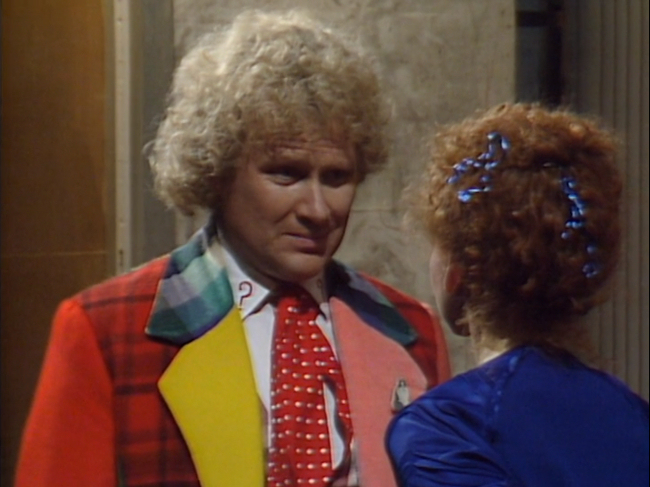
It was Colin Baker's birthday yesterday so I watched The Ultimate Foe, his final serial as the Doctor. Perhaps more interesting for the behind the scenes drama, it certainly doesn't feel like a final episode for an incarnation of the Doctor, and Colin Baker infamously refused to return for the regeneration scene of the following serial. But as much as The Ultimate Foe really is an ultimate mess, there are elements I really like about it.
Depending on how it's packaged, you might also encounter this two part serial as the last two parts of a fourteen part serial called The Trial of a Time Lord, and it does close-off a season long story arc about the Doctor being on trial on a Time Lord space station. His prosecutor is the mysterious Valeyard (Michael Jayston), who is revealed in Part 1 of The Ultimate Foe to be a future incarnation of the Doctor, from some time between his Twelfth and final incarnation.

Considering Time Lords are supposed to be able to regenerate only twelve times, it's a good thing the Eleventh Doctor was given more regenerations. Now this choice of words makes more sense—they're spoken by the Master (Anthony Ainley), by the way, who appears suddenly on the courtroom viewscreen as a surprising voice in the Doctor's defence.

And here's another thing in classic Who made better by modern Who. The Master's incarnation as Missy makes sense out of all the old pointlessly complicated machinations of the Master. Really, it makes no sense for the Master to reduce the Doctor to a catatonic state in order to trick the Valeyard so that one day the Master has the pleasure of killing the Doctor himself. It makes much more sense that this is some kind of long, ongoing flirtation.

The three way struggle between the Master, the Valeyard, and the Doctor which occurs in the Matrix--a computer simulated world that holds the archive of the Time Lords--seems to be set in the grimy back alleys of Victorian London. Robert Holmes' original script apparently included a subplot about Jack the Ripper. Holmes died before he was able to complete the second episode script and John Nathan-Turner, script editor at the time, apparently was not abashed by circumstances enough to refrain from editing out significant portions of the late writer's script. This despite Holmes being regarded one of the best writers in the series' history, going back to the Second Doctor era. But it sounds like the air of panic surrounding the show's failing ratings at the time prompted aggressive bureaucracy. Which may be why the second episode, ultimately written by Pip and Jane Baker, spends so much time ragging on bureaucracy.

The Doctor and his reluctant ally Glitz (Tony Selby), in attempting to meet with someone who is presumably the Valeyard, are continually frustrated by a series of identical Dickensian clerks named Popplewick (Geoffrey Hughes). Glitz, by the way, is one of the best things to come out of the Sixth Doctor era, and I love how the Doctor decides he's the perfect person to pull along with him into the Matrix. An intergalactic burglar introduced at the beginning of the season in another story by Robert Holmes, Glitz would later appear again in the Seventh Doctor era. Selby's performance is a delight--he would've been a much better companion than Mel (Bonnie Langford). When she inexplicably turned up in the courtroom and trumpeted her own trustworthiness in the flat tone of a five year old at a spelling bee, even now I automatically thought, "Really? This is really going to be a companion?" I didn't feel satisfied until I learned later that Langford was already well known for being on another series before Doctor Who. That explained a lot. I do still like the confusing way Mel is introduced, though. I'm still not sure how much of it was intended by the writers or just a result of the general chaos behind the scenes--how the Doctor first sees her in footage from his future in Terror of the Vervoids and then meets up with her in The Ultimate Foe at a point in her timeline after she's met him.

As for the birthday boy himself--what else can I say about Colin Baker? I do like the bit where he pretends to submit to his fate when the court seems to find him guilty of genocide. It's one of those moments where the Doctor really demonstrates his cleverness and Baker pulls it off.

No comments:
Post a Comment